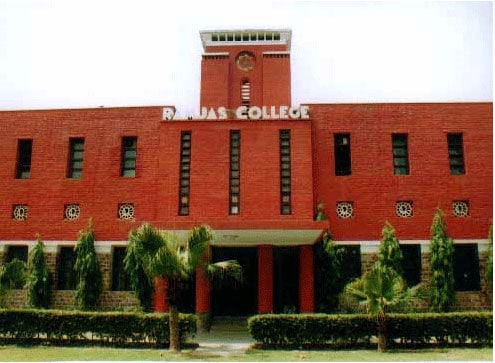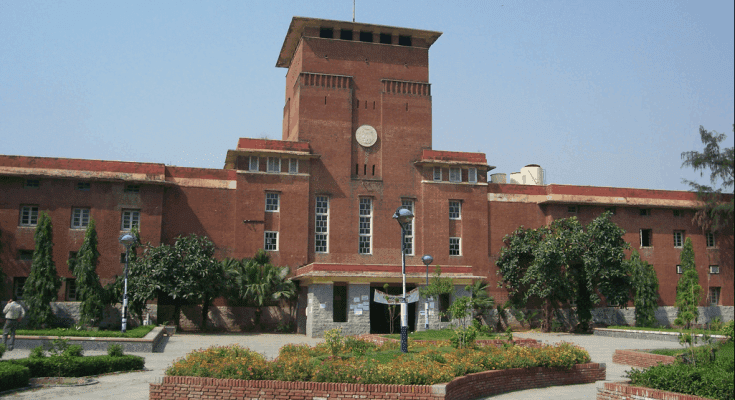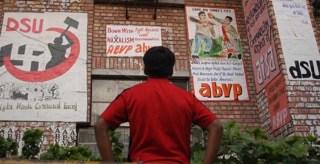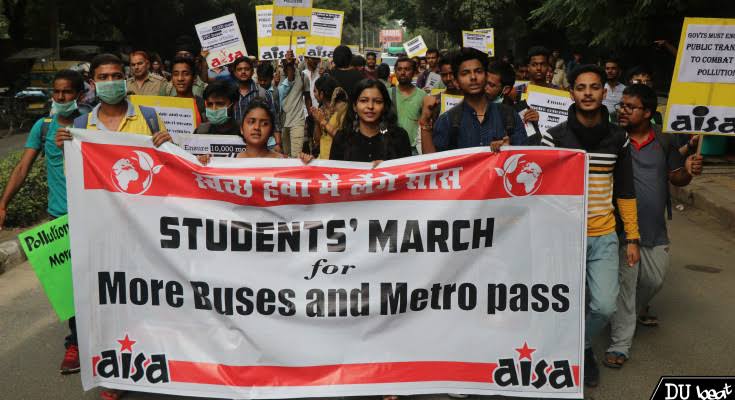Throughout its storied history, Delhi University has gained a reputation as a political university. This article takes a look at the political perception of DU and its credibility.
If there is one thing you know about me, reader, it is that I absolutely love telling stories. In fact, I was indulging this exact habit a few weeks ago in a conversation with a friend as I regaled him with the ridiculous tales of DU politics I’d come across during my first month as a correspondent at DU Beat. As I finished my story about yet another instance of some student organisation appealing to their college’s admin on some glamorous student issue that would be great for attracting votes, he laughed and said something that would stick with me for a while. He told me, “Man, you’re a DU student, of course you get dragged into political events.”
“What a strange remark,” I thought, “And really? With JNU right there?” Therefore, I decided to try and figure out why universities like DU have been entrapped in prisons to the politics of the time and here we are. The answer? It starts – just like DU – in the 20s.
Delhi University was established in 1922, with just four affiliate colleges: St. Stephen’s, Hindu College, Zakir Hussain College and Ramjas College. A place like Delhi University, with the space for intellectual stimulation and debate that it offers, was always going to be an incubator for students that cared about where their country was going and were ready to do something about it. Thus, it is not a surprise that students of the varsity were actively involved in the freedom struggle. St. Stephen’s and Ramjas actively participated in the Non Cooperation and Civil Disobedience movements. Hindu College was at the front of the nationalist movements in the 20s – it is the only college since 1935 in Delhi to have a student parliament. This parliament gave a platform to leaders like Mahatma Gandhi, Subhash Chandra Bose, Jawaharlal Nehru and Motilal Nehru. The people that walked the halls of these institutions – students and staff alike – were nationalists.
In the 70s, Indira Gandhi’s government declared the Emergency and the country grappled with an authoritarian regime that refused to listen to the opposition. In such a situation, it seems you can always count on the youth of a nation to bring their fire and their impassioned appeals for change. And they did not disappoint at the time either! Delhi University saw the rise of the two major student organisations, the National Students Union of India (NSUI) and the Akhil Bharatiya Vidhyarthi Parishad (ABVP). The former is the student front of the Congress while the latter is backed by the Rashtriya Swayamsevak Sangh (RSS). Alongside them, other student organisations such as Students Federation of India (SFI) and All India Students Association (AISA) also arose, albeit nowhere near to the dominance of the NSUI and ABVP. At the time, the ABVP regularly campaigned against the government, establishing itself with its anti-authoritarianism and anti-emergency protests. This period of tension culminated with the arrest of the Delhi University Student Union (DUSU) president at the time, Arun Jaitley. As Shraddha Iyer declares in her piece for DU Beat, “The arrest of Arun Jaitley had one implication for students: the centre fears their ability to mobilise against them.”
Delhi University has since been home to all kinds of political debates and discussions between different ideologies. While most students do not buy into the exact ideologies of the numerous student organisations waiting to spend lakhs to buy their votes, there is a general acceptance of free ideals and a willingness to raise their voices in favour of what is right and against what is wrong.
In 2020, with the controversial CAA being passed around in the Houses of Parliament, there was a line of protests across the nation. At the forefront? The young minds of one of the country’s most respected universities. DU students did not shy away from arranging mass protests against the bill. They showed, very adamantly, that the majority of the next generation of this grand nation did not agree with the kind of administration that was being set in place for the future that they were to inherit. They claimed that the CAA was unconstitutional as by excluding Muslims it went against India’s core tenet of secularism, Against the central government’s repeated attempts to shut them down – some of which were ridiculously dirty – the students raised their voices even higher. The protests were disrupted by the pandemic in the end, but the students had proved that 50 years on from the events of Emergency, the students of Delhi University were still ready to fight for what they cared about.
Alongside these admittedly impressive showings of power by the students, the dirtier side of student politics has also flourished. Student politics are seen as a platform before taking the next step and joining politics at the government levels. Every year in September, the DUSU elections take place at the university. The campuses are gripped by election fever as lakhs are spent by student organisations to butter up the newest batch of students. There is a frenzy for power and authority as the streets are filled with processions of people proclaiming slogans of their respective affiliations. Student organisations feel that the September winds bring back importance to the always prevailing student issues and decide to launch protests across campuses. As I write this article, on September 14th, there are protests taking place in various colleges such as Ramjas, Shyam Lal College, Zakir Hussain, Lakshmibai College and more. All of them are carried out by the ABVP on issues ranging from fee hikes to, for some reason, a boys’ common room. There are seemingly infinite wads of cash thrown by all organisations at alcohol, parties, trips to the water park and fast food for students in a bid to secure their loyal votes.
It gets darker, there are regular reports of politically incited violence on the campuses of the University. It is particularly harsh for the candidates in the running for the positions of the DUSU. In September 2019, the ABVP alleged that the NSUI attacked their candidate for Joint Secretary. Two days later, the NSUI alleged that the ABVP attacked their candidate for vice-president. In 2022 alone, there have been multiple allegations against the ABVP by the NSUI and SFI accusing the rightist organisation of violence.
In the end, it seems my friend was right about DU being political. It may be a perception that’s a little too absolute and dismissive, but it is right to some extent. Delhi University can be a political hotbed. However, more often than not, this is a direct consequence of being a space for debate and discussion of different ideologies right at the capital of the country. Hundreds of students from different backgrounds from different parts of the nation attend this famed university. That kind of exposure brings with it intellectual debates and discussions hidden within the fun of campus life.
All DU ever asks its future students is one thing: what are you willing to stand for? For the pre-independence students of the university it was freedom. For the students in the 70s it was anti authoritarianism. For the students in 2020, it was a sense of secularism and unity. As the elections roll around and the exaggerated showings of student support start, DU and its historically active alumni now ask you, dear reader, “what will you stand for?”
Read also: Prisoner to Political Parties
Featured Image Credits: The Hindu
Siddharth Kumar
[email protected]









